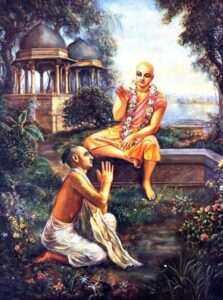Chastising Rasikananda
One day Rasikananda became absent-minded while listening to a lecture on the Srimad Bhagavatam in the royal assembly in Ghantashila. Becoming angry at this, Syamananda Prabhu kicked him twice. Rasikananda Prabhu felt very embarrassed, and prostrating at his Gurudeva’s lotus feet repeatedly requested his forgiveness. Feeling very joyful, he said that by receiving such mercy from Gurudeva in the form of these kicks, his life was blessed and that all his auspicious and inauspicious actions had been destroyed[1].
[1] Chastisement from the Guru is important for various reasons. Here is what Srila Prabhupada said about receiving chastisement from the spiritual master. “Therefore, in the first chastisement, Kṛṣṇa was accepted as spiritual master. A spiritual master has the right to chastise. Father, spiritual master, they are advised to chastise. Putraṁ ca śiṣyaṁ ca tāḍayen na tu lālayet. So father and teacher is advised by Cāṇakya Paṇḍita that “You should always chastise your son and disciple. Chastise.” Tāḍayet. Tāḍayet means “Simply chastise. Always find out the mistake.” Don’t be angry, but it is the business of the teacher and the father simply to find out your mistakes, not to find out your good things. Tāḍayen na tu lālayet. Lālayet means patting: “Oh, my dear son, my dear boy, you are so nice. You have done…” Sometimes it is done, but it is the business of the teacher and the father to chastise. Never recognize the disciple’s business or son’s business as very good. Then they will be spoiled. That is the injunction of Cāṇakya Muni. Lālane bahavo doṣāḥ: “If you simply pat, then there will be so many faults.” Lālane bahavo doṣāḥ. Doṣāḥ means faults. Tāḍane bahavo guṇāḥ: “And if you chastise, oh, they will be very much qualified.” Tāḍane bahavo guṇāḥ, tasmāt: therefore, putraṁ ca śiṣyaṁ ca tāḍayen na tu lālayet, “simply chastise. Don’t pat.” This is the injunction, moral injunction. So, as far as we are concerned, when our spiritual master used to chastise us, we took it as blessing. That was very nice. And he would chastise like anything. “Damn rascal, foolish, stupid,” anything, all good words. (Lecture on SB 2.9.4 — Japan, April 22, 1972)
This is a section of the book “Syamananda, the Joy of Radharani (English)”.
To buy the complete book, click above
Post view 120 times



